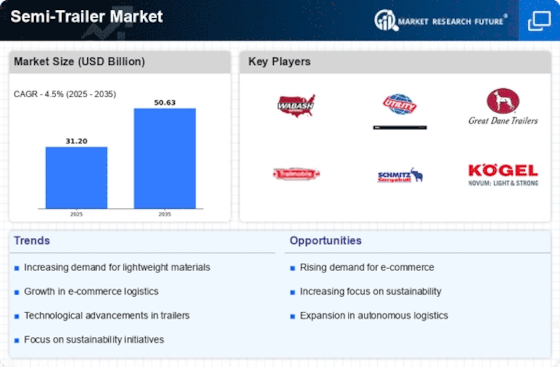Top Industry Leaders in the Semi-Trailer Market
*Disclaimer: List of key companies in no particular order
Traversing the Path: Exploring the Competitive Landscape of the Semi-Trailer Market
The global economy, with its colossal wheels turning, relies profoundly on the unassuming semi-trailer. These indispensable workhorses of the transportation industry bear the weight of diverse cargo, ranging from construction materials to consumer goods. The efficiency of these semi-trailers acts as the linchpin, ensuring the seamless flow of supply chains. However, beneath the surface, a dynamic and competitive landscape intricately shapes the design and trajectory of these mammoth vehicles.
Key Figures at the Forefront:
Leading the charge are prominent entities such as Wabash National Corporation (US), Schmitz Cargobull (Germany), Kögel Trailer GmbH & Co.KG (Germany), Great Dane Trailers (US), American Trailer & Storage (U.S.), PACCAR Inc. (U.S.), China International Marine Containers (Group) Co. Ltd. (China), Utility Trailer Manufacturing Company (the U.S.), Schmitz Cargobull AG (Germany), and Great Dane Limited Partnership (the U.S.), among others. Established giants like Schmitz Cargobull, Krone, and Wielton, armed with decades of experience and brand recognition, command vast production networks spanning continents to meet diverse regional demands. Their considerable bargaining power with raw material suppliers ensures a standardized level of quality and reliability. However, their sheer size can occasionally hinder adaptability and responsiveness to niche requirements.
Contesting this dominance are regional powerhouses like CIMC in China and Mammut Industries in the US. These companies leverage lower production costs and possess a deep understanding of local regulations, allowing them to carve out substantial territories. Their agility enables them to tailor offerings to specific regional needs, often at competitive price points. Nevertheless, they grapple with challenges related to brand recognition and global outreach.
Navigating Influential Factors:
To comprehend the distribution of market share, attention must be directed to several pivotal factors. The type of trailer plays a crucial role, with dry vans, tankers, and flatbeds catering to distinct sectors, each characterized by unique demand fluctuations and profit margins. Companies specializing in specific types can exert influence within those niches.
Technological advancements represent another significant factor reshaping the landscape. The integration of telematics systems, advanced safety features, and lightweight composite materials has become differentiating factors. Companies investing in research and development and actively embracing these innovations gain a competitive edge.
Geography cannot be overlooked, as regional trade patterns, infrastructure development, and regulatory environments influence demand. Adapting production and distribution networks to these nuances is imperative for success in specific markets.
Emerging Trends: Charting the Course Forward:
The future of semi-trailers is being molded by several compelling trends. Sustainability is steering the adoption of greener materials and alternative fuels, with a focus on reducing emissions and fuel consumption. Leading the charge in this direction is Schmitz Cargobull, with its EcoPlus range.
Digitalization is transforming trailer management, with real-time tracking, predictive maintenance, and data-driven optimization of routes becoming standard offerings. Companies seamlessly integrating these technologies into their product lines stand to gain a significant advantage.
The looming prospect of autonomous trucks adds another layer of intrigue. If and when this technology matures, trailer design will need to adapt to accommodate driverless operation. Those at the forefront of this development will be well-positioned to capitalize on this seismic shift.
Competitive Landscape: A Dynamic Race:
The overall competitive scenario in the semi-trailer market is one of intense yet nuanced competition. Established players exert influence through sheer scale and brand recognition, while regional powerhouses cater to specific niches. New entrants continually emerge, vying for market share through product innovation and technological advancements.
Collaboration and partnerships are becoming increasingly prevalent, with companies pooling resources and expertise to address emerging trends like sustainability and digitalization. The ability to adapt to changing market dynamics and anticipate future needs will be the key to success in this ever-evolving landscape.
Industry Developments and Recent Updates:
Wabash National Corporation (US):
• On December 15, 2023, announced the award of a multi-year contract with a major e-commerce company to supply dry van trailers with advanced aerodynamics and lightweighting features. (Source: Wabash National press release)
Schmitz Cargobull (Germany):
• On December 20, 2023, partnered with TrailerLite USA to introduce a lightweight refrigerated trailer for the North American market. (Source: Schmitz Cargobull press release)
Kögel Trailer GmbH & Co.KG (Germany):
• On December 13, 2023, delivered its 100,000th trailer produced at its new plant in Schöllnach, Germany. (Source: Kögel Trailer press release)
Great Dane Trailers (US):
• On December 12, 2023, announced a strategic partnership with Trailer Valet to offer automated trailer loading and unloading solutions. (Source: Great Dane Trailers press release)
American Trailer & Storage (U.S.): • On December 19, 2023, expanded its trailer rental and leasing operations with the acquisition of a competitor in the Midwest US. (Source: American Trailer & Storage press release)










